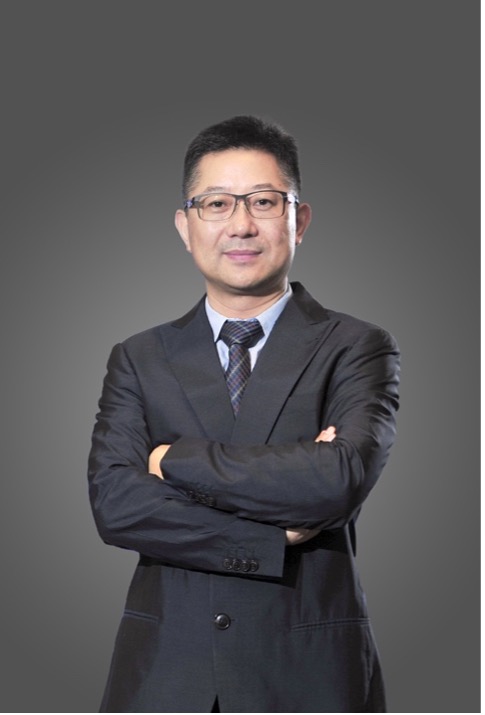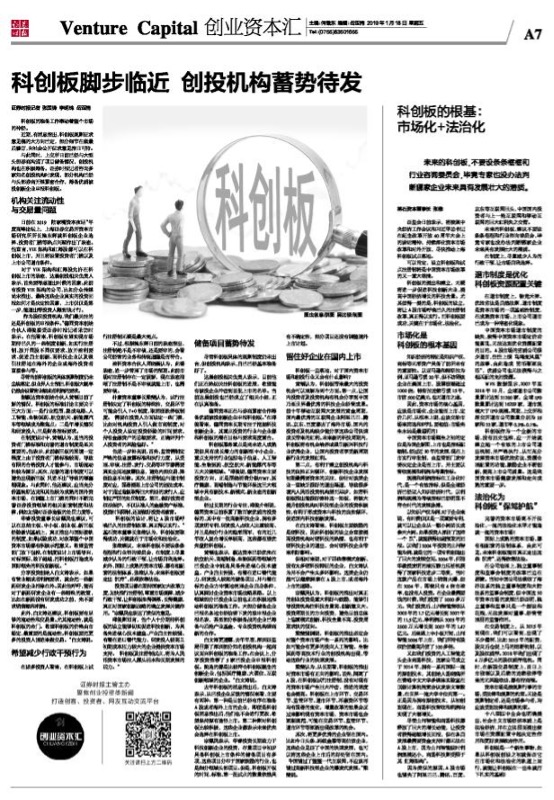2019.01.18 Zhang Wei Views:
China Securities Regulatory Commission (CSRC) says it’s pushing ahead with the reform and opening-up of the capital market by accelerating the pilot program of Shanghai’s Science and Technology Innovation Board, also known as the STAR Market. CoStone Zhang Wei published an article on the Nasdaq-style STAR Market in Securities Times. The article is as follows:


China Securities Regulatory Commission (CSRC) says it’s pushing ahead with the reform and opening-up of the capital market by accelerating the pilot program of Shanghai’s Science and Technology Innovation Board, also known as the STAR Market. CoStone Zhang Wei published an article on the Nasdaq-style STAR Market in Securities Times. The article is as follows:
CoStone Capital Zhang Wei
The original purpose of establishing China’s capital market was to resolve the financing distress of state-owned enterprises (SOEs). And traditionally, China implements a quota system under which companies seeking to go public must receive approval from CSRC. Under this approach, CSRC uses accounting numbers (e.g., ROE) among others to decide whether to list a company or not. Profitability and asset utilization were effective assessment indicators in the Industrial Age, but they no longer apply as the world has been into a new era of knowledge-based economy. The STAR Market will mark a radical shift from the current lengthy and cumbersome process for IPOs. The board’s registration-based listing procedure will reduce regulatory red tape and allow start-ups that have yet to turn a profit to list. But to succeed, the board need to take a market-oriented and law-based approach.
The STAR Market is a ticket to a more market-oriented economy.
As the industrial age gives way to the digital age, the intangible assets such as IP and trademark are of growing importance. Take IP as an example. Sometimes just one patent is enough for a small, obscure company to grow into a big giant. Any investor capable to spot a chance like that can receive juicy returns that exceed their anticipations. Sunward (002097) and SenseTime are two portfolios of CoStone Capital. The former has boosted its profitability prospects with one patent, and the latter has developed into one of the leading AI companies with its top-notch world-class original technology.
Both of the two companies have unleased great potential for growth, which has returned handsome profits for investors in turn. However, neither of them could be able to get listed on the A-share market at a time when they needed capital the most. It’s either because of low profitability or the “red chip structure” that blocks their way. The A-share market also missed out on the flotations of internet giants like Alibaba (9988. HK), Tencent (0700.HK), Baidu (BIDU. NASDAQ) and JD (JD. NASDAQ), which led to a great loss on digital dividends for domestic investors.
By contrast, 20 years of losses did not get in the way of Amazon (AMZN. NASDAQ)’s listing in the US, and its stock has witnessed 1000-fold gains. And Tesla (TSLA. NASDAQ) had not been earning any money for 15 years and now it’s worth around $50B, without much fear of being delisted. Whether a company should be listed or not and how much it should be valued are supposed to be up to the market. Those administrative restrictions are suggested to be removed for the Sci-tech Innovation Board. Since there are times when experts cannot tell which companies have the potential to grow, it’s better to let market forces determine where best to invest.
Delisting System is the key to allocate resources in the best way.
“Survival of the fittest” is the natural law applying to delisting system which is one of the basic systems of the capital market. Delisting has been perceived as normal in a mature capital market.
The lack of delisting system in China’s capital market has caused irrational pricing by investors, which is driving the market away from the goal of optimizing resource allocation. Non-eligible companies seldom get delisted, so they strain resources which should have been allocated to good companies. That is a typical example of “bad money drives out good”.
Fortunately, the STAR Market doesn’t have to bear the “burden of history” of this kind. That’s why it’s important to build an effective delisting system to make sure the STAR Market get off on the right foot and stay completely on track with it. In this way, the capital market can play its part in “natural selection” and resource allocation so as to raise the bar for listed companies. To establish a mechanism that would enforce delisting is an important step to maturity and healthy development for China’s capital market.
Keep a legalistic eye on STAR Market
A mature capital market cannot do without rulemaking. It takes a set of rules and regulations that go with the STAR Market for the securities market to avoid falling off the wagon.
An immediate concern in terms of corporate governance is to reform the system of Individual Directors adopted from the Common Law and the system of Board of Supervisors from the Civil Law. 30-year history of China’s capital market suggests that Board of Directors and Board of Supervisors have not been fulfilling their functions of monitoring the directors and executives.
Moreover, there are quite a few loopholes in trading system. Stock market crash and the hasty circuit-breaker mechanism after the meltdown in 2015 plus share-pledge crisis in 2018 are cases in point.
The rules and regulations should remain the same for all types of market participants and everybody is obligated to abide by regulatory mandates. A solid legal foundation in line with market principles will help to lay the groundwork for the STAR Market.
Rewitten by Lu Ying, Edited by Zhang Wei
The year 2019 marks the fortieth anniversary of China’s Reform &Opening-Up, once again, we meet at the turning point of history. What’s the next step for the game, is there any clear guidance? The answer is affirmative.
Our country is enjoying a good momentum of development, which does not come from the Washington Consensus nor the Beijing Consensus. China’s experience has proved that both the visible hand and the invisible hand are crucial: the visible hand, stands for the government-led reform, and would yield benefits for reform and opening up; the invisible hand, stands for the Marginal Power represented by the private sector, and would improve economic efficiency and tax collection, create jobs and employment opportunities.
Provided that we want to protect and expand the benefits form reform, three simple but mandatory agreements are to be made and followed: No.1 Private ownership must be recognized, protected and treated equally with public ownership constitutionally, both ownerships are scared and inviolable;No.2 Make further clarification of the principal position of market economy, “deepen economic system reform by centering on the decisive role of the market in allocating resources”, as President Xi addressed in the third Plenary Session of the 18th CPC Central Committee;No.3 Implement the guiding principles of “comprehensively promoting law-based governance” of the fourth plenum. The rule of law is essential for economic growth, irreplaceable to protect private ownership, and necessary to encourage innovation and entrepreneurship.
Above are three rules for us to avoid falling into the Middle-income Trap. Assuming that we are breaking systematic barriers to private enterprises’ participation in market economy, and boosting innovation and entrepreneurship of our society, then we are heading towards a promoting direction. We are marching in the path of light, regardless of the ups and downs of Sino-US relationship, the drop in GDP growth rate, or the monetary policy.
These principals also apply on knowing how better to run a business: don’t be hedged by rules and regulations at the beginning, pay more attention to your survival, and you’ll learn more when you start your second business.
For many years, Huawei has been the only Chinese company on the list of the Top 50 R&D Spenders. Regardless of the economy and its income, what Huawei has been doing is investing in its future, dedicated to R&D, continuously and resolutely. This provisional work underscores Huawei’s accomplishments, making Huawei anindustry leader.
So, there are standard answers on how to run a company,which could be summarized as concentration and professional dedication, continuous investment on innovation and trying harder in R&D. Entrepreneurship is also important, every single company needs entrepreneurs to push aside all obstacles and difficulties, to implement strategies and ideas. We, as investors, are destined to look for such outstanding entrepreneurs and their companies, invest in them and partner with them.
At this key point of history, a country, a company, or asingle individual, will all need to find the right path. Four decades after the Reform and Opening-up, it’s time to learn from our experience and stop “wadding across
